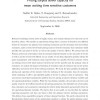Free Online Productivity Tools
i2Speak
i2Symbol
i2OCR
iTex2Img
iWeb2Print
iWeb2Shot
i2Type
iPdf2Split
iPdf2Merge
i2Bopomofo
i2Arabic
i2Style
i2Image
i2PDF
iLatex2Rtf
Sci2ools
108
click to vote
EOR
2010
2010
Pricing surplus server capacity for mean waiting time sensitive customers
Resources including various assets of supply chains, face random demand over time and can be shared by others. We consider an operational setting where a resource is shared by two different classes of customers, the primary class (existing customers) and the secondary class (new firms) customers, under a service level based pricing contract with the secondary class customers which specifies the unit price of service as well as the quality of service offered. We assume that the Poisson arrival rate of secondary class of customers depends linearly on the unit price of service as well as on the service level offered. In our model, we use delay dependent priority scheme for queue management and stationary mean expected time as a quality of service measure. Given an existing service level based contract between the service provider and the primary class of customers, we analyze the impact of inclusion of secondary class of customers has on the system utilization and service level of the ex...
| Added | 10 Dec 2010 |
| Updated | 10 Dec 2010 |
| Type | Journal |
| Year | 2010 |
| Where | EOR |
| Authors | Sudhir K. Sinha, N. Rangaraj, N. Hemachandra |
Comments (0)

